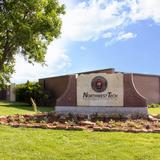- Part of the University of Nebraska system, the Nebraska College of Technical Agriculture is a two-year institution with a statewide mission of preparing students for successful careers in agriculture, veterinary technology and related industries. NCTA is known for its affordable tuition, high job-placement rate for its graduates, and for the success of student teams in competitive activities including crops judging, ranch horse events, livestock judging, shotgun sports, stock dog trials, and intercollegiate rodeo. The college is consistently ranked as one of the best two-year schools in the nation.
- Nebraska College of Technical Agriculture (NCTA) offers a unique campus setting. Nestled in the canyons of south west Nebraska the campus is a State Arboretum and Tree City USA. You may enjoy your walk to class in a park like setting, picnic tables are frequently occupied by students studying, eating or just enjoying the beautiful surroundings. Students will enjoy many activities on campus throughout the year. NCTA students can choose to participate in Varsity Sports, Rodeo Team, Equestrian Team, Judging Team, Ranch Horse Team and several clubs and originations, including Collegiate FFA and 4-H. NCTA has a climate controlled arena that the students are welcome to use with their own horses. (Equine Safety class required). Horse boarding is also available within walking distance of the campus. NCTA is committed to providing students with the preparation necessary to develop highly technical employable skills or to continue educational opportunities at a baccalaureate granting university.
School Highlights
Nebraska College of Technical Agriculture serves 340 students (76% of students are full-time).
The college's student-teacher ratio of 19:1 is higher than the state community college average of 16:1.
Minority enrollment is 28% of the student body (majority Hispanic), which is less than the state average of 37%.
Quick Facts (2025-26)
- Enrollment: 340 students
- In-state tuition: $5,026
- Out-state tuition: $9,446
- Student-teacher ratio: 19:1
- Minority enrollment: 28%
- Source: Verified school update
School Overview
The teacher population of 18 teachers has stayed relatively flat over five years.
Nebraska College of Technical Agriculture
(NE) Community College Avg.
Carnegie Classification
Special Focus Two-Year: Other Fields
Not applicable, not in Carnegie universe (not accredited or nondegree-granting)
Institution Level
At least 2 but less than 4 years
At least 2 but less than 4 years
Institution Control
Public
Private not-for-profit
Total Faculty
18 staff
233 staff
School Calendar
Student Body
The student population of Nebraska College of Technical Agriculture has declined by 11% over five years.
The student-teacher ratio of 19:1 has increased from 16:1 over five years.
The Nebraska College of Technical Agriculture diversity score of 0.44 is less than the state average of 0.57. The school's diversity has grown by 464% over five years.
Total Enrollment
340 students
1,449 students
Student-Teacher Ratio
19:1
16:1
# Full-Time Students
260 students
127 students
# Part-Time Students
80 students
1,322 students
# Enrollment Undergraduate
340 students
26 students
# Full-Time Undergraduate Students
260 students
114 students
# Full-Time Graduate Students
n/a
14 students
# Part-Time Undergraduate Students
80 students
1,322 students
Total Dormitory Capacity
220 students
357 students
% American Indian/Alaskan
n/a
1%
% Asian
n/a
3%
% Hispanic
4%
16%
% Black
1%
6%
% White
72%
63%
% Hawaiian
21%
2%
% Two or more races
2%
3%
% Non Resident races
n/a
1%
% Unknown races
n/a
5%
Diversity Score
0.44
0.57
College Completion Rate (Students who graduate in less than 4 years)
43%
45%
Average Graduate Earnings (10 Years)
$49,400
$35,400
Tuition and Acceptance Rate
The public in-state tuition of $5,026 is more than the state average of $4,615. The in-state tuition has declined by 8% over four years.
The public out-state tuition of $9,446 is more than the state average of $5,803. The out-state tuition has grown by 72% over four years.
In-State Tuition Fees
$5,026
$4,615
Out-State Tuition Fees
$9,446
$5,803
% Students Receiving Some Financial Aid
53%
81%
Median Debt for Graduates
$21,362
$11,000
Median Debt for Dropouts
$6,500
$5,161
Extracurriculars
Total ExtracurricularsTotal Extra-curric.
21 extracurriculars
ExtracurricularsExtra-curric.
Club or Organization:
Recreational Athletic Programs:
Ag Business ClubAggie Rodeo Association
Collegiate CattlemenCollegiate FFA
Crops Judging TeamCRU
Farm Bureau ClubLivestock Judging Team
Phi Theta Kappa Honor SocietyRanch Horse Team
Rodeo TeamSafari Club
Stock Dog TeamStudent Senate
Student Technicians of Veterinary Medicine AssociationTrap Shooting Club
Women in Ag
Recreational Athletic Programs:
Intramural BasketballIntramural Flag Football
Intramural softballIntramural Volleyball
Source: 2024 (or latest year available) Integrated Postsecondary Education Data System (IPEDS) , School Administrators
Frequently Asked Questions
How much does Nebraska College of Technical Agriculture cost?
Nebraska College of Technical Agriculture's tuition is approximately $5,026 for In-State students and $9,446 for Out-State students.
Recent Articles

The Rise of Technical and Vocational Training in 2025
Explore the 2025 surge in technical and vocational training—enrollment, policy, costs, and why this path is gaining ground for students and parents.

Stackable Credentials: How Community Colleges Advance Careers
Discover how community colleges use stackable credentials to build career pathways, boost earnings, and enable lifelong learning in 2025.

High-Paying Jobs You Can Get with a Community College Degree
Discover top high-paying careers you can launch in 2025 with a community college (associate) degree and high-growth credentials in tech, healthcare and trades.












